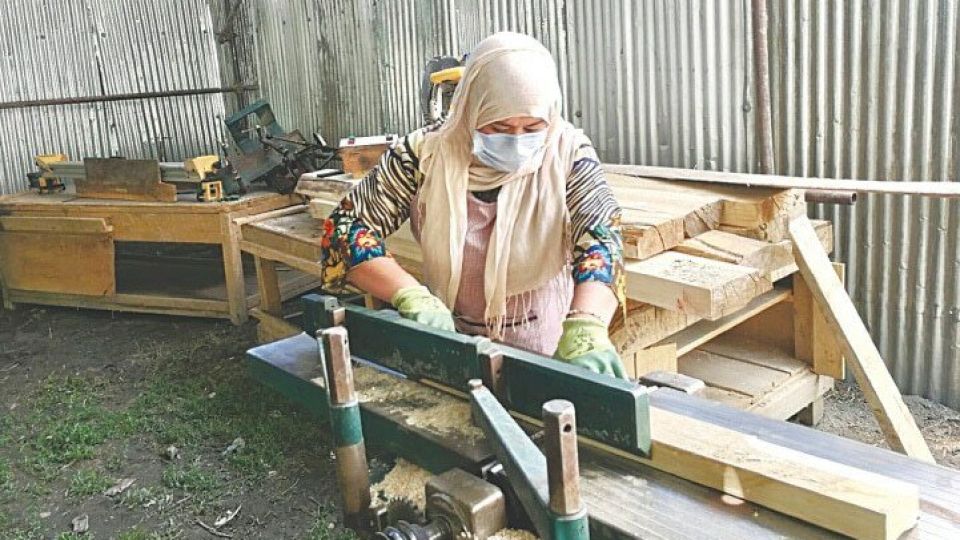June 5, 2023
ISLAMABAD – Bibi Amna is the first woman in central Hunza, Gilgit Baltistan to pursue a career in carpentry. She started in 2008, a time when women felt extremely reluctant working shoulder to shoulder with men, by working at Ciqam Green Project woodwork workshop, located in Karimabad, near the famous Altit Fort.
She faced multiple challenges in her journey. Firstly, she struggled to find her place in a male-dominated field. Secondly, she was advised many times by her relatives to stay home and do stitching work and cook for her family.
Despite these obstacles, Amna remained steadfast and is now one of the finest female carpenters in Hunza, who ventured into training other girls in carpentry.
As the valley is famous for its rich variety of fruits and dry-fruits, majority of its women work in fruit-cropping and very few of them venture into challenging fields like carpentry.
Women in Hunza are increasingly turning to carpentry to support themselves and the livelihoods of their families
Bibi Amna chose the field of carpentry after having conversations with her family.
“My mother always supported me in my journey,” Bibi Amna says. “She encouraged me to pursue carpentry by telling me nothing can be achieved without hard work, be it for men or women.”
Despite facing backlash from society, Amna reports that it is with the support of the workshop’s management and her teachers that she has managed to make a comfortable life for herself today.
Bibi Amna tells Eos that hers is not the only journey that has been hard. Her friend and colleague Gulshan has also struggled with finding acceptance in society.
“It took us more than four years to learn the required skills because had to maintain distance from our male colleagues,” says Bibi Amna.
Nadia is another female carpenter in the same workshop who has been working as a carpenter for the last 10 years.
Nadia is a junior carpenter but she has already learnt to design musical instruments and carve woodenware and other traditional items.
“Shafqat Karim taught me everything I know about carpentry. He is known for his expertise on taxidermy art and designing musical instruments,” says Nadia. “I don’t find the work of carpentry to be too hard. I believe with the right passion and concentration, you can achieve anything.”
“I know a good number of females who are interested in learning carpentry but social taboos and cultural barriers stop them from working towards their dream job,” Nadia laments.
Chief Executive Officer of Ciqam Green Project Aqela Bano tells Eos that though music is a rich and strong part of their indigenous culture, people are forgetting it which is why they [Ciqam Green Project] work for its revival.
She says their main focus of training women with such skills is to preserve their rich culture. In this effort, women carpenters of the Ciqam workshop have been trained to make archaic musical instruments and traditional wooden-carved items.
“Initially, we only had two women carpenters but the number of craftswomen began to increase when local women witnessed the success of former women carpenters,” says Aqela.
Ciqam Green Project is a part of the Agha Khan Rural Support Program (AKRSP) initiative that was launched in 2008. It is non-profit and aims to improve the lives of the people in Gilgit Baltistan and Chitral, particularly women.
Ciqam now has modern machines and tools imported from foreign countries which has eased the time and labour of female carpenters.
Bibi Amna has trained several young girls who have adopted modern skills to create new woodware. She is proud to see her students diversify and excel.
Shafqat Karim has trained a number of men and women in the area in carpentry. He has taught 20 female carpenters how to make musical instruments, kitchen wares and other wooden items.
“I believe it is an excellent job for women because they can apply these skills in their houses and sell their products online and in markets. They can make an independent living and not be dependent on their families,” he says.
Women in carpentry in Hunza, like Bibi Amna and Gulshan, have not only been able to improve their own lives but also significantly contributed to changing their family’s lives.
“I was earning Rs 6000 per month and gradually the salary increased. I spent on my brother’s education, family, on my marriage then gave birth to a baby and constructed a house and bought a car and much more all from my carpentry job,” Amna tells Eos cheerfully.
She is hopeful one day there would be numerous women carpenters across the Gilgit region and they would be making their ends meet and living an independent and accomplished life.


